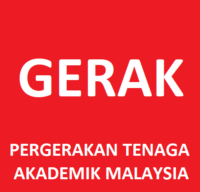3 January 2020
GERAK is not a fair weather friend. Hence, we find it sad and extremely unfortunate that the first working day of the new year was marred by the resignation announcement of the most approachable and reformist Education Minister for a long time, Dr Maszlee Malik.
We came out in support of Dr Maszlee when he was first appointed minister and, despite having often been openly critical of some of his decisions, we stand by him at this juncture.
Dr Maszlee, who steps down today (3 Jan), clearly understood the mess Malaysia’s higher education system had been dragged into and the tough decisions that needed to be made.
Ironically, much of the worthwhile strategies and policies he designed or helped to design and implement only at school level are now suddenly being highlighted by the media.
This is the same media that virtually hounded him throughout his short tenure, ridiculing and vilifying him, without bothering to look deeper into what he was doing.
This is the same media – and the vocal pseudo-liberals, the pseudo-progressives, even conservatives – wanting to sensationalise rather than analyse. What strange but convenient bedfellows.
Be that as it may, GERAK’s concern and purpose here is to outline and acknowledge three main initiatives that Dr Maszlee had put in motion for higher education over the past 20 months. And, perhaps, propose the way forward.
First, based on a genuine concern for academic freedom and autonomy, Dr Maszlee set into motion the dismantling of the much-criticised and abused University and University Colleges Act (UUCA).
Having quickly plucked the low-hanging fruit in the Act – hence allowing undergraduates to formally discuss politics on campuses – Maszlee then set up a multi-stakeholder technical committee. Together with independent outside consultants the committee has been hard at work to repeal the UUCA and also Act 605. A repeal is being targeted for later this year.
Many outside academia are unaware that Act 605 is the main act that virtually muzzles Malaysian academics. Under the Act, university academics even need permission to praise the government!
Second, under his tenure a new, independent committee for the selection of public university Vice Chancellors was set up in mid-2019.
This is in line with GERAK’s call for the abolishment of political appointments of top university posts and the implementation of independent selection procedures.
As expected, this has not gone smoothly, largely due to resistance by the incumbents, who have used the old standard practice of garnering the support of powerful individuals and institutions outside academia.
Nonetheless, the procedures have been put in place to replace these old, politically-linked and feudal ways. It is now up to all parties concerned to make sure the system works for the betterment of Malaysian public universities.
Third, Dr Maszlee also set up an independent Integrity Committee, outside the confines and possible constraints of the Ministry, to investigate cases of fraud and malpractices within universities.
It is never easy to conduct such investigations, since, more often than not, complaints and allegations need to be backed with solid evidence.
And, given the nature of previously-BN controlled institutions, deep-rooted, bad habits and practices are difficult to unravel, let alone destroy.
Such, indeed, has been the case with all these three initiatives begun by Dr Maszlee.
It is easy to vilify the individual without having much information. It is equally easy to blame the individual, without looking at the existing system and the foot-dragging and other forms of resistance employed by those not happy with reforms.
Dr Maszlee, we believe was trust into an extremely visible and demanding ministry. He was virtually caught between a rock and a hard place, torn between a desire for reform and the narrower political demands of the party.
But for what he’s done despite this, GERAK offers our thanks.
That having been said, in looking ahead, GERAK proposes three possibilities for higher education in Malaysia.
First, the formal splitting up of the Ministry into two ministries; a Ministry for non-tertiary education, formulating strategies and policies for education from the nursery to secondary school levels.
And a separate ministry for tertiary education. Here a ministerial position for Dr Maszlee could be possible, indeed advantageous, given the initiatives he had begun during his tenure.
Modern formal education is too complex and complicated to be lumped together under one ministry.
Second, GERAK believes the depoliticisation of education is necessary, to make us more equipped to face a fast changing, challenging world.
Hence, while many are clamouring for the appointment of faded and fake degree politicians as the next Education Minister, GERAK would propose just two names – K.S. Jomo and Sham Sani.
Both are intellectual giants who have had vast experience in academia. Both, we are confident, can remove deadwood and political and religious lackeys and bring forth genuine reform.
Third, that whoever takes over as the next minister looks seriously at GERAK’s original 10-point proposal for reform and continues with the process that Dr Maszlee had started.
GERAK EXCO


